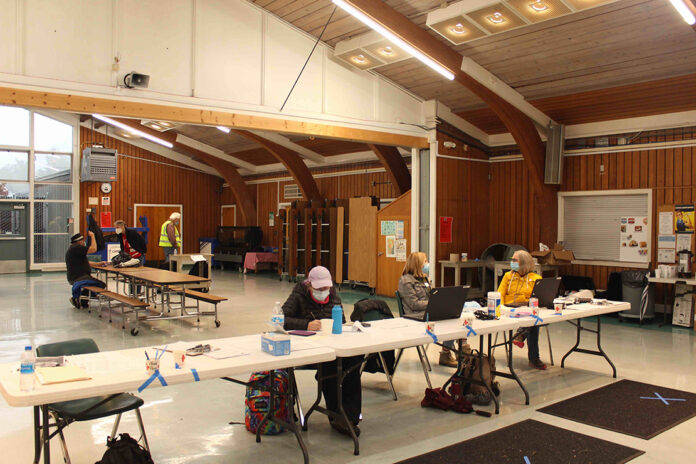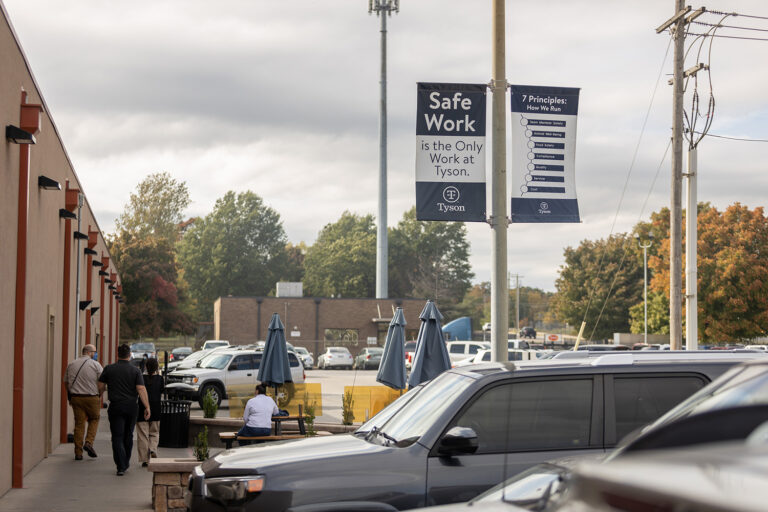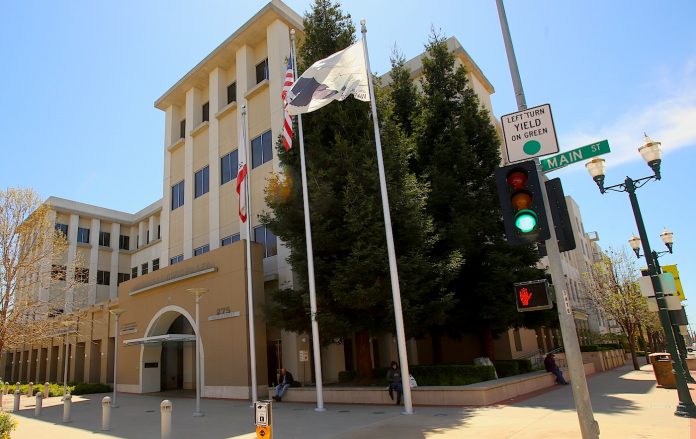Emma Goldberg, The New York Times
Corporate America has entered the next phase of its effort to counter the spread of the coronavirus. Companies of 100 or more employees have until Jan. 4 to ensure all their workers are either fully vaccinated or submit to weekly testing and mandatory masking. The measure was announced by President Joe Biden in September, and details were released Thursday by the Labor Department’s Occupational Safety and Health Administration. Some employers have already stepped forward to establish their own vaccine mandates, but many had been waiting for federal guidance. OSHA’s rule will affect some 84 million private-sector workers across the country, including some 31 million who were believed to be unvaccinated.
Here are answers to some of the most commonly asked questions about what OSHA’s rule means for American workers and their employers.
What is OSHA’s new rule?
Private companies of 100 or more employees must require their workers to be fully vaccinated by Jan. 4 or submit to weekly coronavirus testing and mask-wearing while in the workplace. The deadline for employers to enforce the mask mandate is Dec. 5.
How will OSHA’s rule be enforced?
OSHA is expecting that the vast majority of workplaces will comply with its rule, but it will investigate complaints that workers raise. The agency has a whistleblower system that allows workers to report any possible violations at their workplaces. The agency has tended to be short-staffed on inspectors, labor lawyers said, but it is likely to make enforcement of the rule a high priority.
What is the penalty for violations?
Companies that fail to comply with the rule may be subject to fines, according to an administration official. OSHA’s penalties are up to $13,653 per serious violation.
How can workers report company violations to OSHA?
To report employers who are not in compliance with OSHA’s rule, workers can file a written complaint, submit a whistleblower complaint online or call the agency at 1-800-321-OSHA.
Which employers are covered by OSHA’s rule?
Any employer with 100 or more workers will be required to adhere to the rule. Some smaller businesses have voluntarily issued their own mandates for either coronavirus vaccines or weekly testing. A Gallagher survey of more than 500 businesses released in early November found that the number of employers requiring vaccinations had doubled since August, to 17% from 8% of its survey respondents.
OSHA is currently considering whether to extend the rule to employers with fewer than 100 workers.
Do part-timers and contractors count toward the 100-worker threshold?
All employees, including those working part time, count toward the threshold. Independent contractors do not.
Will the requirements apply to remote workers?
Teleworkers and people who work exclusively outdoors will not be required to be vaccinated or submit to weekly testing because OSHA’s rule is focused specifically on ensuring people’s protection against the coronavirus in the workplace. Employees who work part of the time in the office and the rest of the time remotely are required to follow the rule.
Which vaccines count toward the requirement?
Workers can get any vaccine listed for emergency use by the World Health Organization, which includes two doses of Moderna or Pfizer-BioNTech, and one dose of Johnson & Johnson.
Who can claim an exemption? Who will determine those exceptions?
Employers are required to give two kinds of exemptions to the vaccine mandates: medical and religious. Exemptions for people with certain medical conditions are protected under the Americans with Disabilities Act. Many employers require people to present a doctor’s note to qualify for this exemption. Exemptions for people with sincerely held religious beliefs are protected under Title VII of the Civil Rights Act. So far, no major religion has banned its members from taking the coronavirus vaccine.
Can employees opt out through testing? Who will pay for those tests?
It will be up to employers to determine whether workers can opt out of getting vaccinated by submitting to coronavirus testing. If workers opt to be tested weekly instead of being vaccinated, they must also be masked in the workplace. OSHA does not require employers to pay for or provide tests, given that the vaccine is free and highly effective, but businesses may be required to pay under collective bargaining agreements or local laws.
Will employees be paid for the time it takes to get vaccinated?
Employers have to provide paid time off for their workers to get vaccinated, up to four hours, as well as sick leave for them to recover from side effects. They are required to provide this leave starting Dec. 5.
How will employers verify that workers are vaccinated?
Employers are expected to keep documentation of their workers’ vaccination status, such as a copy of their vaccination cards or a signed and dated employee attestation.
Can employers fire workers who do not comply?
The religious and medical exemptions will come into play here — but when it comes to people who do not have exemptions, employers are generally free to discipline people who do not follow their rules. They may face pushback, though, under collective bargaining agreements.
If workers are fired for not following the rules, are they eligible for unemployment?
A worker’s eligibility for unemployment is determined on a state-by-state basis. Typically, people qualify for unemployment if they are terminated through no fault of their own, but each state has its own standards, and what that means is up to highly varying interpretations.
How long will employers have to put the new standard into effect?
Employers need to act quickly: The deadline for workers to be fully vaccinated is Jan. 4. With many retail and logistics companies understaffed and overburdened, the January deadline will make it easier for them to face the holiday season.
Do workers who recently tested positive for the coronavirus still have to comply?
OSHA has determined that it would not be feasible for employers to permit exemptions based on prior infection.
Is it legal for employers to mandate vaccines without giving workers an option to instead submit to testing?
Unless workers qualify for an exemption, employers have the right to mandate vaccines without a testing option. In fact, labor lawyers said that OSHA has indicated it prefers employers to mandate the vaccine.
What tests meet the standards of this rule?
All coronavirus tests approved for emergency use by the Food and Drug Administration are permitted, including so-called PCR (or polymerase chain reaction) tests, considered the gold standard for detecting infection, along with the rapid antigen tests, which are less sensitive.
Do employers have to provide their workers with paid time off for COVID testing?
No. Employers have to provide paid time for getting the vaccine and sick leave for recovering from side effects, but they are not required to provide leave for testing.
If employees are spread over various workplace locations, is the company still expected to comply with OSHA’s rule?
Yes, even companies whose 100 or more employees are distributed across different sites are expected to comply, according to labor lawyers.
Do companies affiliated through common ownership have to count all employees when looking at the 100-worker threshold?
Labor lawyers said that most likely what constitutes a single employer entity will be defined by the same rules and definitions used for taxpaying purposes.
Will this rule apply to employers that are not private businesses, such as local governments and public school districts?
No. OSHA’s rule specifically applies to private-sector employers with 100 or more workers. Nonprofit organizations are covered by the rule.
Does OSHA’s rule cover employees of colleges and universities?
Private colleges and universities, but not public ones, are covered under OSHA’s rule.
Does the federal rule supersede any conflicting state laws on vaccine mandates?
OSHA’s standard preempts the existing rules of state governments, except in states that have their own OSHA-approved agencies dealing with workplace issues. Those state agencies have to enact a rule at least as effective as OSHA’s.
Once OSHA’s rule is put in place, what portion of the U.S. population is expected to be vaccinated?
It is estimated that about 31 million of the 84 million workers covered by the rule are currently unvaccinated and that 72% of them will get the vaccine because of the new requirements. A Goldman Sachs analysis in September found that about 90% of American adults will have received at least one dose of the vaccine by mid-2022. As of early November, about 80% of adults in the United States had been vaccinated.
What legal authority does OSHA have to create this rule?
The Occupational Safety and Health Act gives OSHA authority to respond quickly to emergency situations when workers are confronted with grave threats. Because of the serious threat posed by the pandemic, the agency has issued an emergency temporary standard allowing it to put in place this new rule. Labor lawyers say this is within OSHA’s legal authority. Still, the rule is likely to face challenges, and dozens of attorneys general have already threatened to sue.
“The pushback is going to be on the question of, ‘Is this an occupational hazard?’” said Doug Brayley, an employment lawyer at law firm Ropes & Gray. “When you’ve got a virus circulating everywhere, is it within OSHA’s authority to regulate it as an occupational health matter? I think OSHA will prevail, but I’m not certain.”
This article originally appeared in The New York Times.





















